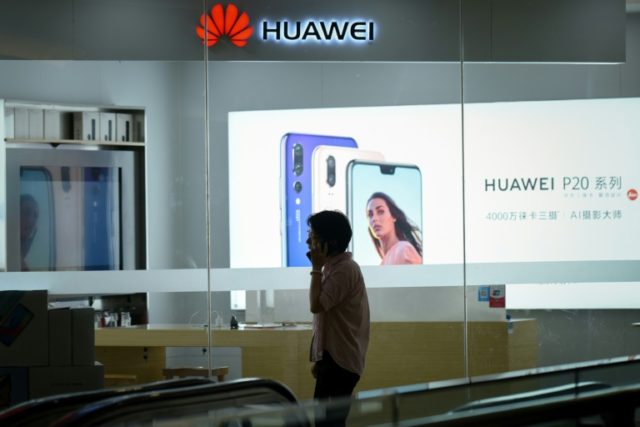The U.S. government is urging allied nations to avoid using telecommunications equipment from China’s Huawei Technologies Company, even though some of those countries have already made large purchases of Huawei equipment, according to a report published Friday.
The U.S. has expressed concerns that Chinese military and intelligence units have compromised Huawei products, posing security risks.
The Wall Street Journal reported on Friday that U.S. officials are concerned about host countries using Huawei equipment in close proximity to American military bases and about Chinese tech compromising the security of next-generation 5G wireless networks. The U.S. military has some dedicated equipment for its most sensitive communications, but a great deal of the communications traffic from American installations in foreign countries passes through local telecom networks.
American officials are offering detailed briefings on the security risks posed by Chinese equipment:
The briefings are aimed at dissuading governments and telecom executives from using Huawei network components in both government and commercially operated networks. A core focus of the briefings is Beijing’s ability to force Chinese corporations to comply with government requests from government authorities, a U.S. official said.
The talking points also emphasize how wireless and internet networks in a few years could be more susceptible to cyberattacks or espionage, people familiar with the briefings said. Today’s cellular-tower equipment, for instance, is largely isolated from the “core” systems that transfer much of a network’s voice and data traffic. But in the 5G networks telecom carriers are preparing to install, cellular-tower hardware will take over some tasks from the core—and that hardware could potentially be used to disrupt the core via cyberattacks. For that reason, U.S. officials worry that Huawei or ZTE cellular-tower equipment could compromise swaths of a telecom network.
Huawei is the world’s No. 2 smartphone maker behind Samsung Electronics Co. It is the global leader for telecom equipment, such as the hardware that goes into cellular towers, internet networks and other infrastructure that enables modern communication.
The company has been all but shut out of that market in the U.S. after a 2012 congressional report labeled it a national-security threat. American officials say the company could be compelled by Beijing to use its knowledge of its components to snoop on or disrupt telecommunications networks.
The Journal noted American officials are not alone in these concerns. Australia has already banned Huawei and another Chinese company, ZTE, from participating in its 5G network, while the U.K. is conducting a telecom security review that does not specifically name any companies but may be motivated by concerns about Huawei, whose products are popular in Britain. The WSJ article also mentions a “new wariness” toward Huawei in Germany and the possibility of restrictions on its products in Japan.
Unfortunately for concerned U.S. policymakers, Chinese technology is already well established in many allied countries. Italian telecom executives reportedly told U.S. officials they simply cannot stop using Huawei and ZTE products because the Chinese equipment is inexpensive and flexible. A British telecom executive described Huawei as the “only true 5G supplier right now” to the Journal.
Reuters reported on Friday that Huawei has signed 22 commercial contracts for 5G networks so far and is opening an information security lab in Germany to help defuse security concerns before auctions for 5G network spectrum next year.
A group of senior German officials is mounting a last-ditch effort to ban Chinese companies from the 5G project. The German foreign and interior ministries are said to be especially concerned about Chinese participation after speaking with their counterparts in the United States and Australia.
“There is serious concern. If it were up to me we would do what the Australians are doing,” one German official said, referring to Australia’s ban on Huawei and ZTE. Even the German left, which is generally opposed to freezing entire countries out of German markets, has expressed apprehension about Huawei and pointed to Chinese cybersecurity laws that literally require all Chinese companies to “collaborate in national intelligence work.”
Huawei has consistently denied allegations that it works with Chinese intelligence and issued such a response to the Journal piece on Friday:
Huawei is surprised by the behaviors of the US government detailed in the article. If a government’s behavior extends beyond its jurisdiction, such activity should not be encouraged. Huawei firmly believes that our partners and customers will make the right choice based on their own judgment and experience of working with Huawei.
No Chinese corporation has a good answer to the simple truth that Chinese law absolutely requires them to work with Beijing’s military and intelligence operations upon demand. Even if it were true that Huawei is not currently injecting backdoors and other security flaws into its products for the benefit of Chinese intelligence, the government could compel it to do so tomorrow and arrest its executives instantly if they hesitated to comply.
The Wall Street Journal reported on Friday that stocks in Chinese tech companies are dropping as a result of the U.S. campaign against them, and indeed because of the Journal’s own reporting on that campaign. Conversely, the shares of European competitors to Huawei and ZTE such as Ericsson and Nokia are rising as the looming possibility of bans or caps on Chinese products creates market opportunities for them. The Chinese government has denounced U.S. warnings about the security of Huawei and ZTE products as protectionist schemes to suppress Chinese competition and create market share for American and European companies.

COMMENTS
Please let us know if you're having issues with commenting.